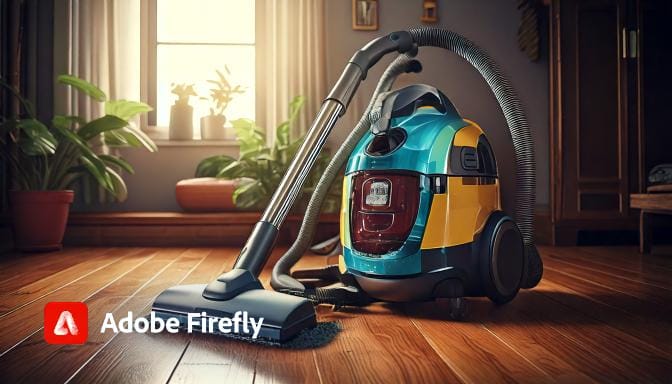5 Vacuum Myths and Facts You Must Know Uncover the Truth About Your Vacuum Cleaner

When it comes to cleaning your home, your vacuum cleaner plays a crucial role. But with so many misconceptions floating around, it’s easy to misunderstand how these devices actually work. Should you be vacuuming every day? Does higher wattage mean better performance? Is a bagless vacuum really the superior choice?
In this post, we’ll dive into five common vacuum myths, reveal the facts, and help you make smarter decisions when it comes to choosing and maintaining your vacuum cleaner. Let’s bust some myths!
Myth 1: Higher Wattage Means Better Suction
The Truth: Suction power isn’t just about wattage.
It’s a common assumption that the higher the wattage, the more powerful the vacuum. While wattage measures the energy consumption of the motor, it doesn’t always translate to stronger suction.
What really matters:
- Motor design: A well-engineered motor can provide efficient suction with lower wattage.
- Airflow: The vacuum’s ability to maintain steady airflow directly impacts its suction.
- Sealed system: A well-sealed vacuum ensures no air leaks, maintaining consistent performance.
Takeaway: Don’t be fooled by wattage alone. Focus on design, airflow, and efficiency when choosing a vacuum.
Myth 2: Vacuuming Every Day Damages Carpets
The Truth: Daily vacuuming can extend the life of your carpet.
Some people believe that frequent vacuuming will wear out the fibers of their carpet. In reality, vacuuming regularly helps prevent dirt, dust, and debris from settling deep into the carpet, which can cause damage over time.
Why daily vacuuming helps:
- Prevents dirt buildup: Dirt particles act like tiny blades, cutting carpet fibers.
- Keeps allergens at bay: Reducing dust and allergens improves indoor air quality.
- Maintains appearance: Regular vacuuming keeps your carpet looking fresh and new.
Takeaway: Vacuum frequently to protect your carpet and improve your home’s air quality.
Myth 3: Vacuums with Bags Are Outdated and Less Efficient
The Truth: Bagged vacuums are still highly effective—and often better for allergies.
In an era where bagless vacuums dominate, many think that bagged models are outdated. However, bagged vacuums offer several advantages, especially for allergy sufferers.
Benefits of bagged vacuums:
- Better dust containment: Bags trap dust, dirt, and allergens, preventing them from being released back into the air.
- Low-maintenance: Replacing a bag is easier and cleaner than emptying a dustbin.
- Consistent performance: Suction power remains steady as the bag fills, unlike some bagless models.
Takeaway: If you have allergies or prefer a cleaner disposal process, a bagged vacuum might be the better option.
Myth 4: You Don’t Need to Clean the Vacuum Filter
The Truth: A dirty filter reduces suction and overall performance.
Many people overlook their vacuum’s filter, assuming it’s a “set it and forget it” component. But a clogged filter can significantly impact your vacuum’s suction power and efficiency.
Why filter maintenance matters:
- Maintains suction: A clean filter allows for better airflow and suction.
- Improves air quality: Filters trap fine dust and allergens, preventing them from being recirculated.
- Extends vacuum lifespan: Regular maintenance keeps the vacuum running smoothly.
Pro tip: Check your vacuum’s manual for filter cleaning or replacement intervals, and don’t skip this crucial step.
Myth 5: All Vacuums Are the Same for Pet Hair
The Truth: Pet-specific vacuums are designed to handle fur, dander, and more.
If you have pets, you know how challenging it can be to keep your home fur-free. Not all vacuums are up to the task, and choosing the right one can make a big difference.
What makes a vacuum pet-friendly:
- Specialized brush rolls: Designed to lift pet hair from carpets and upholstery without tangling.
- HEPA filtration: Traps pet dander and allergens, improving air quality.
- Extra tools: Pet-specific vacuums often come with attachments like motorized pet brushes and crevice tools.
Takeaway: If you’re a pet owner, invest in a vacuum designed to handle pet hair and allergens effectively.
Conclusion: Choose Wisely and Maintain Properly
Understanding the facts behind these common vacuum myths can help you make better choices when buying and maintaining your vacuum.
Key takeaways:
- Don’t be swayed by wattage alone—look for well-designed vacuums with efficient airflow.
- Vacuuming regularly is good for your carpet and air quality.
- Bagged vacuums are far from outdated, offering excellent dust containment.
- Clean your vacuum’s filter regularly to maintain performance.
- For pet owners, a specialized vacuum can make all the difference.
When you separate myth from fact, you’ll not only get better cleaning results but also extend the life of your vacuum and keep your home cleaner and healthier.
FAQs: Clearing Up More Vacuum Misconceptions
1. Do cordless vacuums have less suction than corded models?
Not necessarily. While cordless vacuums used to lag in power, modern models now offer comparable suction to many corded vacuums.
2. Is it safe to vacuum hard floors with a regular vacuum?
Yes, but using a vacuum with a brush roll shutoff or a dedicated hard floor mode is recommended to avoid scratches.
3. How often should I replace my vacuum filter?
It depends on usage and the type of filter. Check your vacuum’s manual, but a general rule is to clean or replace it every 3-6 months.
By staying informed and following these tips, you can keep your home clean and make the most of your vacuum cleaner!
